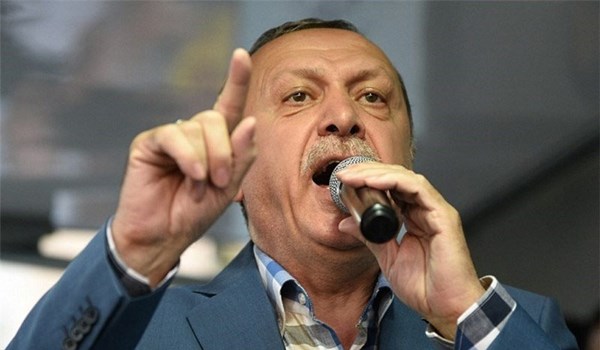 Turkish President Recep Tayyip Erdogan lashed out at Germany on Sunday for blocking rallies in support of him ahead of a vote on boosting his powers, likening the ban to “Nazi practices”.
Turkish President Recep Tayyip Erdogan lashed out at Germany on Sunday for blocking rallies in support of him ahead of a vote on boosting his powers, likening the ban to “Nazi practices”.
The attack came a day after German Chancellor Angela Merkel called Turkish Prime Minister Binali Yildirim to try to defuse the row, which has put a major new strain on already bruised ties between the NATO allies.
Local authorities in Germany, citing security concerns, have banned several rallies by Turkish ministers ahead of an April 16 referendum on whether to approve changes to the constitution.
“Germany, you are not even close to democracy,” Erdogan told a women’s rally in Istanbul. “Your practices are not different from the Nazi practices of the past.”
He added: “I thought it’s been a long time since Germany left (Nazi practices). We are mistaken.”
The cancellations have infuriated the Turkish government, which accused Berlin of working against the “Yes” campaign in the referendum and summoned the German ambassador to the foreign ministry in protest.
After Erdogan’s outburst, Turkish Foreign Minister Mevlut Cavusoglu spoke by phone with German counterpart Sigmar Gabriel late Sunday, a call that came at the request of the German side, a Turkish official said on condition of anonymity.
The pair are set to meet on Wednesday, it was announced last week. In a bid to defuse the row, Merkel also called the Turkish premier on Saturday.
Germany is home to the largest population of Turks outside Turkey with around three million in the country of Turkish origin, the legacy of a massive “guest worker” programme in the 1960s-70s.
– ‘Undesirable’? –
Erdogan’s ruling Justice and Development Party (AKP) says the changes would bring political stability.
But the vote is widely seen as a referendum on Erdogan himself because the proposed plan could see him stay in power until 2029.
Opponents however say the changes that would grant sweeping new powers to the head of state would make parliament dysfunctional and promote a one-man rule model.
Austrian Chancellor Christian Kern said Sunday that Turkish politicians should be banned from political campaigning across the European Union.
“A collective EU response to prevent such campaign events would make sense so that individual countries like Germany where appearances are forbidden don’t end up being pressured by Turkey,” Kern told German newspaper Welt am Sonntag.
Turkish rallies have also come under scrutiny in the Netherlands where Dutch Prime Minister Mark Rutte said a planned pro-Erdogan rally in Rotterdam on March 11 would be “undesirable”.
Erdogan on Sunday said other EU member states with significant Turkish communities were likely to follow suit.
“The Netherlands acted similarly and maybe others will follow,” he said. “It doesn’t matter where you come from. If you talk about democracy, you must live up to it.”
But he reserved his strongest rhetoric for Germany.
“You will lecture us about democracy and then you will not let this country’s ministers speak there,” he said.
“We no longer want to see the Nazi world. We don’t want to see the practices of those fascist regimes.”
– Months of tension –
Tensions with Germany, a European Union heavyweight, have simmered for months, especially since the failed bid in July to unseat Erdogan.
Ankara has launched a vast crackdown in the aftermath of the failed putsch, which has seen more than 100,000 people arrested, dismissed or sacked for alleged links to the plotters or to Kurdish militants.
Berlin has criticised the arrest of Deniz Yucel, 43-year-old Turkish-German dual national correspondent for Germany’s Die Welt newspaper charged by an Istanbul court with spreading terrorist propaganda and inciting hatred.
“That man is a terrorist, not a journalist,” Erdogan told another Istanbul rally, as he accused Berlin of “putting my ministers on the same scale” with him.
Erdogan also said that, if he wanted to, he would go to Germany himself, but warned: “If you don’t let me in, or if you don’t let me speak, I will make the whole world rise up.”
On Friday, the president said the journalist had been sheltered at the German consulate for a month before his detention, claiming that he was a “German agent.”
YAHOO/AFP

Leave a Reply
You must be logged in to post a comment.